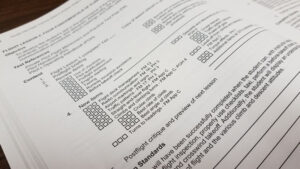 Have you ever become frustrated while flying with someone in a training environment? Most pilots have at one time or another. Whether the frustration is due to the student or the instructor,when such situations occur, it is easy to want to give up. However, learning how to reduce frustrations is manageable and can positively impact your training.
Have you ever become frustrated while flying with someone in a training environment? Most pilots have at one time or another. Whether the frustration is due to the student or the instructor,when such situations occur, it is easy to want to give up. However, learning how to reduce frustrations is manageable and can positively impact your training.
Frustrations can come from many different sources. For instructors, it can be frustrating when students show up to a lesson unprepared. I ran into this with one of my first students when I was a freshly certificated instructor. I didn’t notice anything early on because he was a brand new student and had never flown before. However, as he progressed through training, I realized he was not coming to lessons adequately prepared. He didn’t know how to configure the aircraft for maneuvers, he was slow in executing procedures, and he was not familiar with the airports we were flying to. We were far enough into training that these things should not have been an issue.
I realized the responsibility fell on me to give my student every opportunity to be prepared. At the end of each flight lesson, I would brief him on what the next lesson would include and give him a homework assignment to prepare. Sometimes I assigned reading; other times I asked him to describe a procedure or teach me about a topic.
The results were surprising. I found my student, who had formerly been unprepared and unmotivated, arrived for lessons eager to fly and confident in his abilities. He wanted to learn how to fly; he just didn’t know how to learn to fly. By assigning homework, I was able to narrow his focus so he knew exactly what to expect and how to prepare for each lesson. If you find your students are unprepared for a lesson, consider whether you gave them enough information to be prepared. An unprepared student is more often the fault of the instructor than the student.
On the other hand, I have also had students who came to lessons overconfident and with a know-it-all attitude. In some ways, this is a more difficult problem to handle since the student may not realize there is an issue. The best action for the instructor is to gently show students areas where they are lacking and then challenge them to progress.
One of my students had recently transferred to the flight school I was instructing at. During our first lesson he claimed to be nearly ready for his instrument checkride. I was doubtful and wanted to see how proficient he really was, so during that lesson, I started with simple tasks but also introduced more difficult procedures to challenge him. By doing this, he and I were both able to see that his instrument flying skills were adequate, but he still needed a lot of work flying approaches and holding patterns.
The instructor’s role is so important in minimizing frustrations in the aviation training environment, but just as instructors can become frustrated with students, the opposite is true as well: perhaps to a greater extent. The student must rely fully on the instructor to provide for all of his or her training needs. If the instructor is lacking in some way, then frustrations can mount quickly for the student.
 There are several basic rules instructors should follow to help minimize student frustrations. It is imperative that instructors use a structured syllabus. A syllabus is an easy way to give students an overview of each lesson, assure all required areas are covered, and track their progress through training. The syllabus can also include assignments and tests so students are able to stay informed and know what will be expected of them. Without a syllabus, students may lose motivation since they have no way of knowing where they are in the training process. Gleim offers a syllabus for Sport, Private, Instrument, and Commercial Pilot training, which includes all ground and flight lessons as well as suggested reading assignments.
There are several basic rules instructors should follow to help minimize student frustrations. It is imperative that instructors use a structured syllabus. A syllabus is an easy way to give students an overview of each lesson, assure all required areas are covered, and track their progress through training. The syllabus can also include assignments and tests so students are able to stay informed and know what will be expected of them. Without a syllabus, students may lose motivation since they have no way of knowing where they are in the training process. Gleim offers a syllabus for Sport, Private, Instrument, and Commercial Pilot training, which includes all ground and flight lessons as well as suggested reading assignments.
In addition to following a syllabus, it is also important that instructors give appropriate feedback to students. When a student performs well on a maneuver, give credit where credit is due. Alternatively, should your student need more work, give feedback in a way that encourages the student to improve, rather than a harsh critique. A thorough briefing before and after each flight can also go a long way in reducing frustrations.
Finally, instructors should do their best to keep flying fun. Remember a simple rule: If you are bored teaching something, then your student will probably be bored trying to learn from you. This applies to both flight and ground instruction. Instead of simply lecturing through the material or flying maneuvers, keep things interesting by incorporating scenario-based training into your lessons depending on what kind of flying your student hopes to do.
 A great way to add interest to lessons on the ground is to use the Gleim Virtual Cockpit and Gleim X-Plane Flight Training Course. Endless scenarios can be created and flown in the simulator that you may not be able to do in the airplane. X-Plane can also be used to teach students about avionics, aerodynamics, emergency procedures, and nearly every possible maneuver that can be done in the real plane, even maneuvers that would not be safe to demonstrate in the real world.
A great way to add interest to lessons on the ground is to use the Gleim Virtual Cockpit and Gleim X-Plane Flight Training Course. Endless scenarios can be created and flown in the simulator that you may not be able to do in the airplane. X-Plane can also be used to teach students about avionics, aerodynamics, emergency procedures, and nearly every possible maneuver that can be done in the real plane, even maneuvers that would not be safe to demonstrate in the real world.
As frustrations arise, remember that it is up to you to decide how you are going to handle them. Students should do their best to come to lessons prepared and ready to learn. Instructors should work hard to create an environment in which students feel comfortable learning. Flying should not be a frustrating experience. Let’s work together to keep flying fun!
Written by Karl Winters, Gleim Aviation Editor and Instructor
About Gleim Aviation
Since 1980, the Gleim Aviation team of pilots, instructors, writers, designers, and programmers has helped aviators pass millions of FAA knowledge and practical tests using the unique Gleim Knowledge Transfer System. Gleim is an environmentally-friendly company headquartered in Gainesville, FL.

